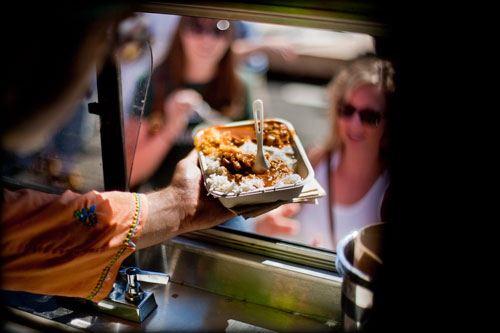WASHINGTON DC – It’s Farragut Friday, and a dozen food trucks are buzzing with office workers on their lunch breaks.
But instead of feeding customers, TaKorean’s Mike Lenard and DC Slice’s Tom MacDonald stand in the middle of Farragut Square in their red “Truck Yeah!” T-shirts with a folder full of press releases and measuring tape.
“There’s no guarantee that there would be food trucks here,” says Lenard of regulations that Mayor Vince Gray’s administration proposed last month.
Those rules could restrict trucks from vending in areas with fewer than 10 feet of “unobstructed” sidewalk. Counting lamp poles and tree boxes as obstructions, eight of D.C.’s ten most popular food truck locations would be off-limits. The city has said it would make exceptions for areas like Farragut Square by creating “Mobile Roadway Vending” zones with designated spots for food trucks, but operators say it’s unclear how they will choose those locations, how many spots will be available, and which trucks will get them.
So MacDonald and Lenard, both board members of the D.C. Food Truck Association, were trying to spread their message Friday by making themselves available to passerby and TV news reporters. The measuring tape? That’s a prop, to measure the sidewalks for camera crews.
The on-the-street effort is just part of their campaign. Food trucks are growing more savvy and sophisticated in their approach to regulatory threats. Over the last two years, the truck group has transformed from a handful of operators who met on Mondays in the back of Duffy’s Irish Pub into a 501(c)(6) trade association with more than 50 dues-paying members and a registered lobbyist. Next year, the organization will hire a full-time executive director and officially rebrand itself as the Food Truck Association of Metropolitan Washington, tackling mobile vending issues both within and beyond the District proper.
New regulations for the burgeoning industry have forced the food truck association to grow up fast. In order to have a voice among larger, more established, and better-funded groups, it needed to be organized. Now, the group may not be the biggest player in town, but it’s gaining attention. The question remains: Will it make a difference in the latest round of rulemaking?
It helps that food trucks have grown in sheer numbers. Today, there are more than 125 food trucks on the road in the Washington area. Four years ago, it was pretty much just Fojol Brothers. “When I went out there inauguration day in 2009, it was daunting a little bit to figure out how my concept would fit into the regulatory framework,” says Fojol Brothers co-founder Justin Vitarello. The District’s mobile vending rules, focused on ice cream trucks and hot dog carts, hadn’t been updated in nearly 40 years.
Click the link to read the entire article about Washington DC food truck beginning to lobby the city to protect their business interests by Jessica Sidman at washingtoncitypapers.com.




